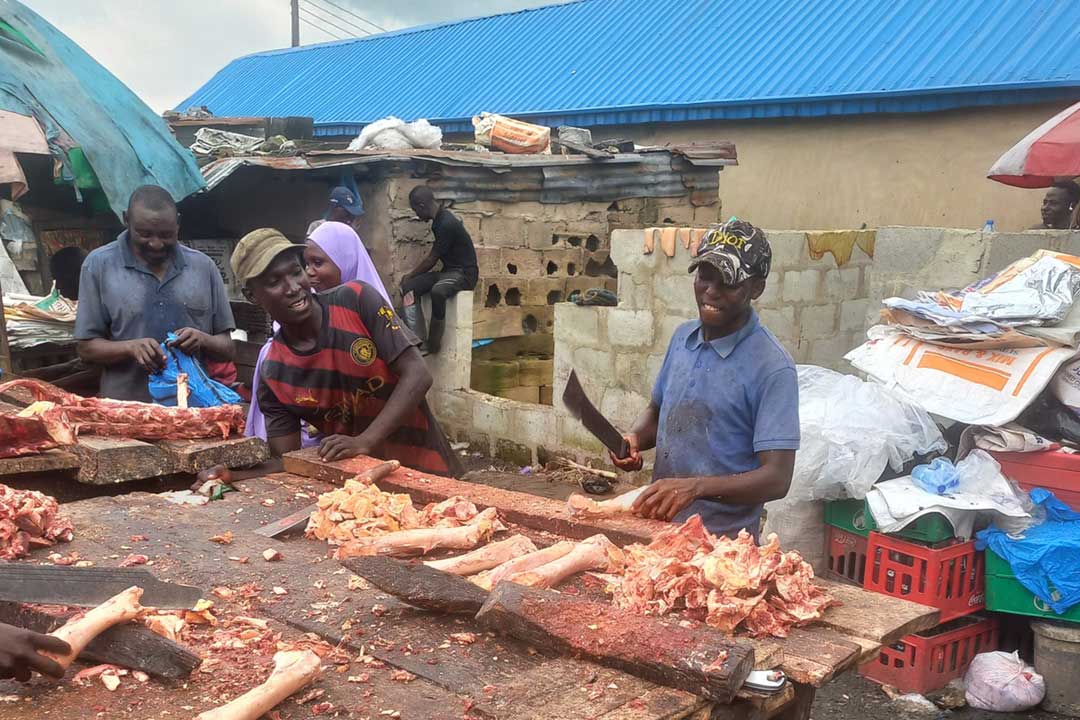BUSINESS

BUTCHERS ACCUSED OF INFLATING MEAT WITH AIR TO DECEIVE BUYERS
In Nigeria, beef holds deep cultural and culinary significance. For many, a meal feels incomplete without it, whether at home or during public gatherings.
However, a recent viral video sparked outrage among consumers after it revealed what appears to be a deceptive practice by a meat vendor in a local market. The footage shows a butcher inserting a slim tube into a chunk of raw meat and pumping it with air and a solution. In just 29 seconds, the meat visibly swells as the butcher turns it over and continues the process.
The clip, which had garnered over 36,000 views on X (formerly Twitter) as of Thursday morning, carried a caption questioning the nation’s economic state and expressing concern over the dishonest act.
Many viewers online condemned the act, calling it a “fraudulent technique” aimed at inflating the weight and size of the meat to charge unsuspecting customers more money.
“They’re using air to pump the meat and faulty scales just to get rich,” one user on X, Flacko, complained.
Another user, Oke Ayodele, wrote, “This isn’t about the economy; it’s outright dishonesty. Nigerians must do better.”
A Facebook commenter, Chintuo Blessing, noted that this method is becoming common, saying, “They pump the tongue, legs, and head. Once you cook it, it shrinks significantly. It’s really disturbing.”
Elsie Williams, also on Facebook, added sarcastically, “You think you’re getting value for your money, then you cook it and wonder what vanished in the pot.”
Butchers Respond: It's a Common Practice
Several butchers defended the practice, arguing that it is a long-standing method used not to defraud customers, but to aid in processing meat.
Salami, a meat vendor based in Lagos, explained, “This isn’t new. It helps in separating the hide from the meat more easily. Those who slaughter cows for festive occasions, especially Muslims, are familiar with this.”
In a similar view, Ishola Azeez, another meat seller in Ibadan, claimed that critics misunderstood the viral video.
“That man was only trying to remove the skin — commonly known as ponmo. Pumping air into the beef makes the skin easier to separate and scrape before cutting. After that, no more air is pumped into the meat,” he explained.
However, a veterinary officer and meat inspector, Dr. Ayo Adelaja, described the practice as a long-standing trick used by some vendors to deceive customers, particularly by targeting parts like the cow head and legs.
“Pumping the head or legs can help in processing, but doing it to other parts for profit is unethical,” he said.
Adelaja also acknowledged that inflating animal skin before flaying is common, especially when the fur is not to be burned off. He emphasized that this differs from pumping chunks of meat solely to make them appear bulkier.
Food Safety and Public Health Concerns
Investigations into meat processing methods reveal that air and brine (saltwater solution) are sometimes injected into raw meat to increase its weight and enhance appearance or tenderness — a process commonly known as “plumping” or “meat enhancement.”
This technique is used globally, with injectors and brine pumps available in the meat processing industry. These tools can improve the look and cooking performance of beef, poultry, and fish.
Dr. Roy Bickerstaffe, a food biochemistry professor, explained that the use of gases like nitrogen and carbon dioxide in food packaging helps preserve products longer by replacing oxygen, which can cause spoilage.
However, health experts have warned that this practice can pose serious risks if not handled under strict sanitary conditions.
Dr. Paul Anejodo, a senior medical officer, cautioned that poor hygiene in open markets and abattoirs could lead to contamination of meat during plumping.
“Contaminated hands, unclean environments, and dirty pump tubes could introduce harmful pathogens into the meat,” he said.
He stressed the importance of regular cleaning of equipment and proper sanitation at meat stalls to reduce contamination risks.
Inemesit Ukpong, a food safety specialist based in Lagos, described air-pumping as a clear case of "food fraud" that tricks buyers into paying for brine instead of actual meat.
“When brine is injected, it displaces the meat weight the consumer is paying for. Sellers do this purely for financial gain, with little concern for public health,” Ukpong explained.
She raised concerns about the quality of water used to prepare brine in local markets and whether it is free from coliform bacteria, which indicate fecal contamination.
Ukpong also warned that excess salt in brine could worsen health issues such as high blood pressure, especially since there’s no regulation indicating how much salt is added.
“Since these meat products are not labeled, customers have no idea how much salt or water has been introduced. Food safety is not about assumptions — it requires measurable actions to ensure public health,” she added.
She called for increased awareness and training for food handlers and meat sellers, emphasizing the need for transparency in food processing.
Regulatory Attention
When contacted for comments, a representative from the Federal Competition and Consumer Protection Commission advised concerned citizens to submit a written complaint with supporting evidence, such as the viral video, for proper investigation.
"This represents a significant development in our ongoing coverage of current events."— Editorial Board









